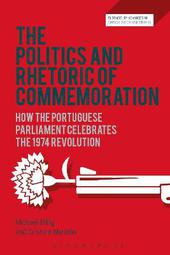
|
The Politics and Rhetoric of Commemoration: How the Portuguese Parliament Celebrates the 1974 Revolution
Hardback
Main Details
| Title |
The Politics and Rhetoric of Commemoration: How the Portuguese Parliament Celebrates the 1974 Revolution
|
| Authors and Contributors |
By (author) Professor Michael Billig
|
|
By (author) Dr Cristina Marinho
|
| Series | Bloomsbury Advances in Critical Discourse Studies |
|---|
| Physical Properties |
| Format:Hardback | | Pages:232 | | Dimensions(mm): Height 234,Width 156 |
|
| ISBN/Barcode |
9781474297738
|
| Classifications | Dewey:946.9044 |
|---|
| Audience | | Tertiary Education (US: College) | |
|---|
|
Publishing Details |
| Publisher |
Bloomsbury Publishing PLC
|
| Imprint |
Bloomsbury Academic
|
| Publication Date |
13 July 2017 |
| Publication Country |
United Kingdom
|
Description
In recent years there has been much interest in collective memory and commemoration. It is often assumed that when nations celebrate a historic day, they put aside the divisions of the present to recall the past in a spirit of unity. As Billig and Marinho show, this does not apply to the Portuguese parliament's annual celebration of 25 April 1974, the day when the dictatorship, established by Salazar and continued by Caetano, was finally overthrown. Most speakers at the ceremony say little about the actual events of the day itself; and in their speeches they continue with the partisan politics of the present as combatively as ever. To understand this, the authors examine in detail how the members of parliament do politics within the ceremony of remembrance; how they engage in remembering and forgetting the great day; how they use the low rhetoric of manipulation and point-scoring, as well as high-minded political rhetoric. The book stresses that the members of the audience contribute to the meaning of the ceremony by their partisan displays of approval and disapproval. Throughout, the authors demonstrate that, to uncover the deeper meanings of political rhetoric, it is necessary to take note of significant absences. The Politics and Rhetoric of Commemoration illustrates how an in-depth case-study can be invaluable for understanding wider processes. The authors are not content just to uncover unnoticed features of the Portuguese celebration. They use the particular example to provide original insights about the rhetoric of celebrating and the politics of remembering, as well as throwing new light onto the nature of party political discourse.
Author Biography
Michael Billig has been Professor of Social Sciences at Loughborough University, UK, since 1986. He was previously a lecturer in Psychology at Birmingham University, UK. He is a Founder member of the Discourse and Rhetoric Group at Loughborough University. Cristina Marinho is at Nottingham Trent University, UK.
ReviewsA very interesting and valuable read. The stimulating writing style, punctuated by thought-provoking questions and the authors' affable sense of humour, contribute to its value. * Journal of Intervention and Statebuilding * Billig and Marinho have done a masterful job of bringing together perspectives and research from such fields as commemoration and memory studies, critical discourse analysis, pragmatics and epideictic rhetoric, all examined against a background of Portuguese history and political science ... Their fine-grained analyses are the result of meticulous work ... A welcome and important addition to the literature. * Journal of Language and Politics * This excellent book allows insight in to the intricate symbolic struggles for hegemonic identity narratives in the Portuguese society, into what is said, but more importantly, what remains unsaid and why. A must-read for scholars and students trying to understand the impact of the politics of the past on present and future social developments. -- Ruth Wodak, FAcSS, Emerita and Distinguished Professor and Chair in Discourse Studies, Lancaster University, UK Michael Billig's and Cristina Marinho's meticulously researched and highly engaging study of the parliamentary commemorations of the Portuguese Revolution demonstrates why it is important to pay close attention to what politicians say, and, more importantly, what they do not say when they remember the national past. Behind what might, at first sight, seem like the formalities of commemorative language and practices - the modes of address, patterns of applause, symbolic gestures like the wearing of carnations, and so on - Billig and Marinho uncover the murky world of partisan politics, and use it to provide a fascinating and original insight into the art of political manipulation. -- Jovan Byford, Senior Lecturer in Psychology, The Open University, UK This book is a brilliant, cultivated and timely case study about national commemorations, political celebration and collective memory. The authors have produced an in-depth study of the annual celebration of Portugal's liberation from dictatorship, and gone beyond the polysemy, ambiguity and controversial nature of this highly particular event. Indeed, they offer an invaluable contribution to the understanding of contemporary political celebrations, political culture and nationalism at a time when democracy is under pressure. -- Jorge Vala, Professor at the Institute of Social Sciences, University of Lisbon, Portugal
|